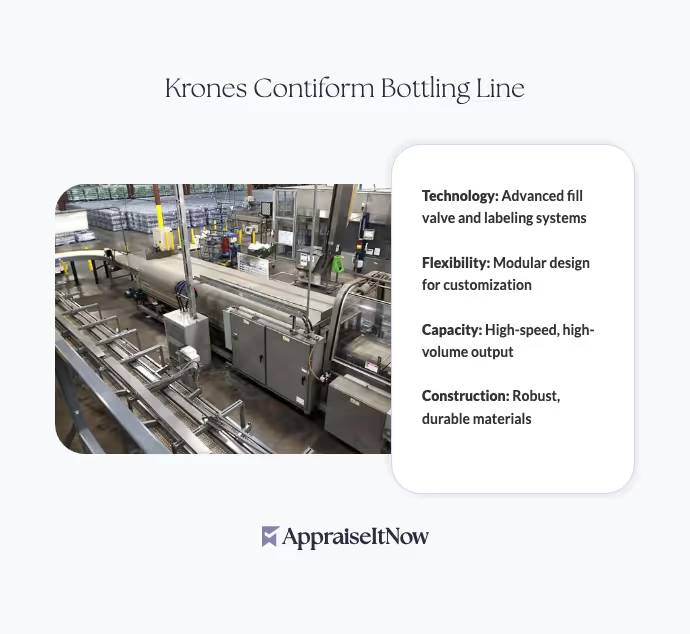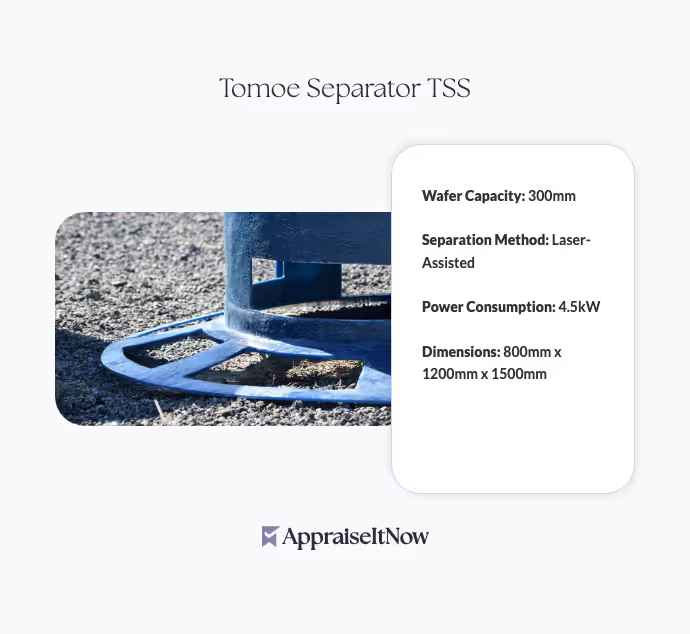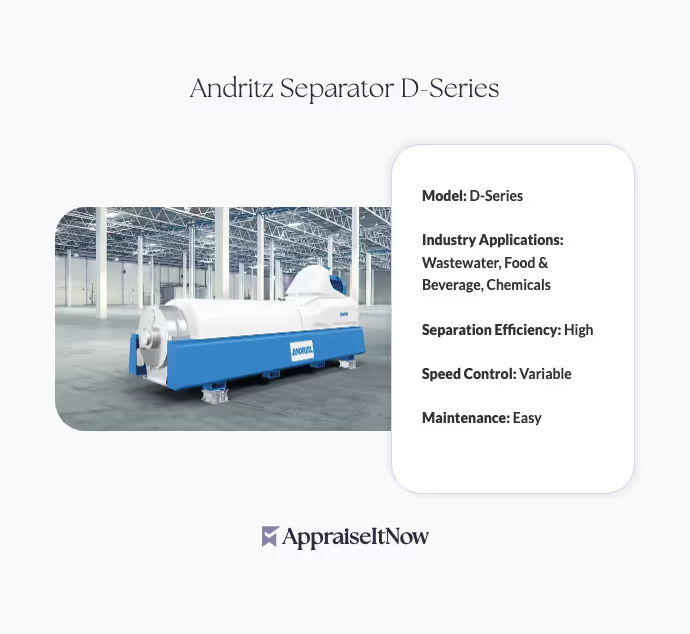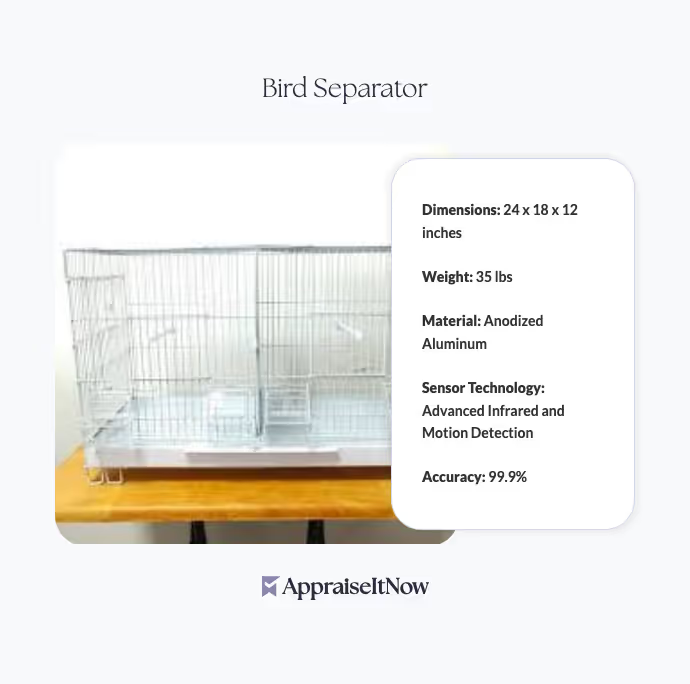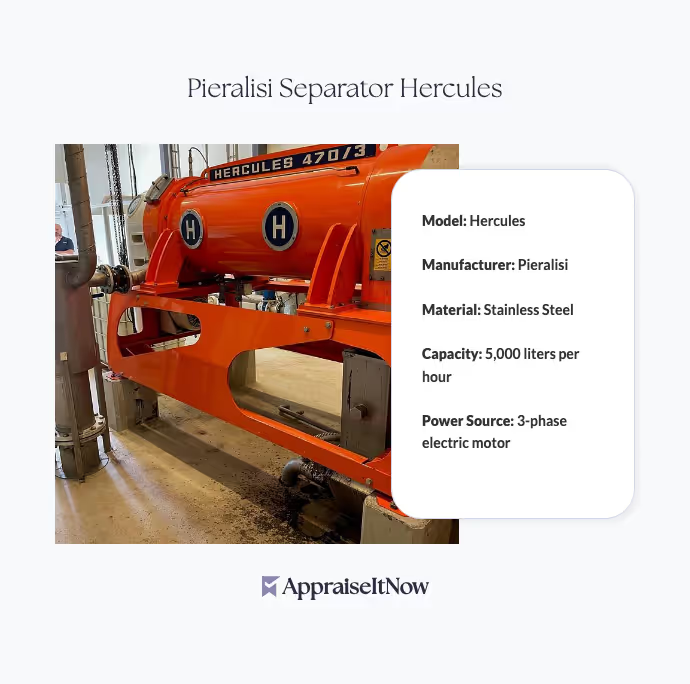<h1>How to Get Your Krones Contiform Bottling Line Appraised</h1>
<p>The Krones Contiform Bottling Line represents a significant investment in your beverage production operation, with current market valuations ranging from <strong>$450,000 to $520,000</strong> depending on condition, throughput capacity, and maintenance history. Whether you're planning to sell, refinance, insure, or verify asset value for financial reporting, understanding how professional appraisals work ensures you receive accurate, credible documentation that stands up to lender, insurance, and legal scrutiny.</p>
<h2>Understanding Your Contiform's Market Position</h2>
<p>The Krones Contiform system stands as a cornerstone asset in modern beverage production because of its sophisticated fill valve technology, automated bottle handling, and proven reliability across 24/7 operations. Introduced in 1990 and refined over decades, these modular systems continue commanding strong secondary market demand across North America and Europe—particularly among mid-sized and regional beverage producers seeking proven, flexible equipment without the capital burden of new machinery.</p>
<p>When evaluating the current secondary market, you should understand that demand remains robust but varies significantly by equipment age, throughput specifications, and control system updates. A well-maintained Contiform line with current PLC programming and recent component upgrades typically sells 15-20% above baseline market values, while equipment requiring significant retrofitting or control system modernization may trade at 20-30% discounts compared to fully updated systems.</p>
<div class="callout tip"><p><strong>Market Reality</strong></p>
<p>Your Contiform's actual value depends heavily on whether buyers can immediately deploy it or must invest in upgrades—a distinction that separates a $520,000 sale from a $400,000 forced liquidation.</p></div>
<h2>Key Factors That Influence Your Equipment's Value</h2>
<p>Understanding what appraisers examine helps you prepare comprehensive documentation and position your asset accurately. The most significant value drivers extend well beyond simple equipment age—they encompass mechanical condition, control system sophistication, spare parts availability, and maintenance history transparency.</p>
<p>Your equipment's throughput capacity directly impacts value. A Contiform rated for 600 containers per minute handles dramatically different production volumes than a 300 CPM configuration, and specialized models designed for specific container materials command different premiums. Stainless steel construction—a Contiform hallmark—provides inherent value stability since this material resists corrosion and maintains structural integrity across decades of operation, unlike equipment with more vulnerable finishes that depreciate faster.</p>
<p>Control system specifications matter enormously in modern appraisals. Original mechanical controls lose appeal compared to systems featuring integrated PLC programming, automated quality control systems, and energy-efficient operation modes. Buyers increasingly demand equipment that integrates seamlessly with current manufacturing software and provides predictive maintenance capabilities. A Contiform with outdated analog controls might face 30-40% value reduction compared to digitally upgraded versions, making control system obsolescence one of the most significant hidden value factors.</p>
<p>Mechanical obsolescence differs from simple aging—it reflects whether your equipment can reliably meet current production standards without expensive retrofits. Common retrofit needs include fill valve upgrades for new beverage types, labeling system modernization to handle contemporary label sizes and adhesives, and control integration for Industry 4.0 connectivity. Appraisers must distinguish between cosmetic wear (which affects maybe 10-15% of value) and functional limitations requiring capital investment.</p>
<div class="callout note"><p><strong>Appraisal Insight</strong></p>
<p>Maintenance records and calibration certificates dramatically strengthen your appraisal value—they prove the equipment remains production-ready rather than requiring post-purchase troubleshooting.</p></div>
<h2>Documentation That Strengthens Your Appraisal</h2>
<p>Professional appraisers conducting equipment valuations follow specific evaluation protocols to ensure their assessments withstand scrutiny from lenders, insurers, and legal representatives. Your preparedness directly impacts appraisal accuracy and often the appraiser's ability to deliver faster turnaround times. When you compile comprehensive documentation before appraisal engagement, you're essentially giving the expert appraiser more confidence to assign higher valuations—assumptions about missing maintenance history typically result in conservative value reductions.</p>
<p>Gather serial numbers for all major components (receiver, fill heads, labeler mechanism, conveyor system), original OEM manuals and technical specifications, service logs documenting maintenance schedules and any significant repairs, PLC program backups and control system documentation, calibration certificates for fill systems and quality control equipment, and complete photographic records from multiple angles including operational views. Import/export records and country-of-origin documentation add credibility, particularly when equipment crossed borders or required regulatory compliance certifications.</p>
<p>Chain-of-custody documentation matters more than many equipment owners realize. If your Contiform changed hands before your ownership, documented sales records, lease-to-purchase agreements, or corporate acquisition files all support the narrative of continuous maintenance. Gaps in documentation often prompt appraisers to apply discount factors—sometimes 5-10% per missing documentation category—as conservative risk adjustments.</p>
<h2>The Appraisal Methodology: What Professionals Actually Do</h2>
<p>Professional beverage equipment appraisers typically employ three distinct valuation approaches, each serving different purposes and producing potentially different results. Understanding these methodologies helps you recognize whether your specific appraisal assignment aligns with your actual needs—because a <strong>fair market value</strong> appraisal differs fundamentally from replacement cost or insurance valuations.</p>
<p><strong>Fair market value</strong> represents what an informed buyer and seller would agree upon in an arm's-length transaction. This methodology requires comparative analysis of recent secondary market sales, which for beverage bottling equipment typically involves contacting used equipment dealers, reviewing online marketplaces, and sometimes attending industry auctions. Appraisers blend this comparable sales data with your specific equipment's condition to estimate realistic market pricing—exactly what you'd likely receive if you listed your Contiform today.</p>
<p><strong>Replacement cost new (RCN)</strong> calculates what an identical new system would cost today, then applies depreciation schedules reflecting age, condition, and obsolescence. This approach matters primarily for insurance purposes, where underwriters need to understand full replacement expense if catastrophic loss occurs. For Krones equipment installed in 2005, for example, RCN might reach $800,000-$1.2 million depending on current factory pricing, but actual fair market value of the used equipment may be only $300,000-$400,000 after 18+ years of depreciation.</p>
<p><strong>Liquidation value</strong> assumes you must sell quickly without optimal marketing time. Forced liquidation scenarios—bankruptcy auctions, facility consolidations, emergency cash needs—typically yield 30-50% discounts from fair market value. Appraisers can differentiate between these scenarios to help you understand the true range: your Contiform might command $520,000 in a patient 90-day private sale, but perhaps only $280,000-$350,000 in a 10-day auction setting.</p>
<p>Understanding these distinctions matters enormously when working with lenders or insurers. Banks financing equipment purchases want fair market value to ensure loan-to-value ratios remain conservative. Insurance companies need replacement cost figures to establish policy limits. Courts in litigation or bankruptcy proceedings often require liquidation scenarios. A professional appraiser clearly specifies which methodology applied—and explains why.</p>
<div class="callout tip"><p><strong>Critical Distinction</strong></p>
<p>Your "fair market value" of $450,000-$520,000 assumes normal market conditions. Insurance coverage might require $900,000+ replacement cost, while quick-sale scenarios could yield only $300,000. Know which number matters for your specific situation.</p></div>
<h2>On-Site Inspection Protocols and Remote Appraisal Limitations</h2>
<p>For equipment valued above $250,000, professional appraisers typically recommend in-person inspections rather than relying solely on photographs and descriptions. When examining your Contiform system, qualified evaluators follow systematic protocols checking mechanical function, measuring wear patterns on contact surfaces, verifying all components operate smoothly, and documenting any deferred maintenance requiring capital investment.</p>
<p>Specialized non-destructive testing (NDT) can detect hidden structural issues—ultrasonic thickness measurements verify metal integrity without damage, visual dye-penetrant inspections reveal micro-cracks in welds or castings, and operational testing under controlled conditions confirms fill accuracy and seal integrity. These technical assessments go far beyond visual inspection, often revealing issues invisible to untrained eyes that might affect value by thousands of dollars.</p>
<p>Can remote appraisals work for bottling equipment? Yes—for lower-value equipment or preliminary estimates, professional appraisers can work from high-resolution photographs, detailed written descriptions, and video walkthroughs. However, comprehensive valuations supporting significant financial decisions typically require on-site assessment. When you engage an appraiser, discuss whether your situation qualifies for remote evaluation. Equipment valued above $400,000 almost universally benefits from in-person inspection, ensuring the appraisal credibility matches the asset's significance.</p>
<p>For an in-depth exploration of beverage equipment appraisal methodologies, our guide on <a href="/blog/understanding-what-goes-into-a-beverage-equipment-appraisal">understanding what goes into a beverage equipment appraisal</a> covers these professional standards in detail.</p>
<h2>Depreciation Schedules and Useful Life Expectations</h2>
<p>Commercial appraisers applying standard depreciation practices typically estimate Krones bottling equipment depreciates over 15-20 year useful lives, though this varies significantly based on maintenance intensity and technological upgrades. A Contiform installed in 2004 (20 years old) might retain 25-35% of replacement cost value, while an identical system from 2015 (9 years old) would typically retain 65-75% depending on condition.</p>
<p>However, useful life estimates don't follow rigid formulas. A meticulously maintained Contiform with recent control system upgrades and current spare parts availability might retain value as effectively as equipment five years newer. Conversely, neglected equipment with outdated controls loses value rapidly—sometimes faster than standard depreciation schedules suggest—because refurbishment costs become prohibitive for potential buyers.</p>
<p>This reality creates appraisal complexity that separates experienced beverage equipment specialists from general machinery appraisers. When seeking professional evaluation, confirm the appraiser possesses specific bottling line expertise rather than generic industrial equipment knowledge. Specialists understand how Krones system architectures age, which components typically require mid-life replacement, and what maintenance patterns indicate genuine reliability.</p>
<h2>Retrofit and Upgrade Considerations</h2>
<p>The question of what buyers actually value in used Krones equipment often hinges on retrofit history. A Contiform featuring original 1990s mechanical fill valves might function adequately, but buyers increasingly recognize that upgraded servo fill valves reduce waste, improve accuracy, and reduce maintenance frequency. Contemporary appraisals typically value this upgrade at $15,000-$30,000 of the total equipment value—a significant increment that reflects the upgrade's functional payback period.</p>
<p>Control system modernization presents similar value dynamics. Migration from original mechanical controls to contemporary PLCs with integrated monitoring, remote diagnostics, and predictive maintenance capabilities can justify $40,000-$75,000 in valuation improvements depending on implementation sophistication. Buyers recognize these upgrades reduce operational risks and extend equipment economic life, justifying capital investment premium pricing.</p>
<p>Labeling system updates similarly affect value—newer label handling equipment supporting contemporary adhesive systems and variable label sizes commands premium valuations. Energy-efficient motor replacements and servo drive upgrades for the bottle handling system add measurable value by reducing operational costs across the equipment's remaining useful life.</p>
<p>Professional appraisers quantify these retrofits using cost-basis methods—adding proportional upgrade costs to baseline equipment value while recognizing that upgrades rarely return full cost dollar-for-dollar. A $25,000 servo valve upgrade might add $18,000-$22,000 to appraised value, reflecting realistic buyer perspectives on retrofit ROI.</p>
<h2>Industry-Specific Factors Affecting Beverage Equipment Value</h2>
<p>Beverage production market dynamics significantly influence your Contiform's appraisal value. During periods of strong craft beverage demand (craft beers, premium waters, functional beverages), used bottling equipment commands premiums as producers expand operations. Conversely, consolidation in carbonated soft drink manufacturing creates equipment surplus, pressuring valuations downward.</p>
<p>Your equipment's specific beverage compatibility matters too. A Contiform configured for beer bottles versus water versus juice concentrate creates different secondary market appeal. Multi-container capability adds flexibility premium, while single-application configurations require finding buyers with matching production needs. Appraisers track these market dynamics to ensure valuations reflect current secondary market realities rather than historical prices.</p>
<p>Geographic location influences value through transportation costs and regional demand intensity. Equipment in established beverage manufacturing regions (Wisconsin, California, Texas, Northeast corridor) typically sells more readily and commands modest premiums versus identical systems in lower-density manufacturing areas. For remote locations, transportation logistics sometimes reduce effective value by 5-10% because buyers must absorb relocation expenses.</p>
<p>Explore our comprehensive resources on <a href="/types/beverage-equipment">types of beverage equipment</a> to understand the broader market context surrounding your Contiform's specific positioning.</p>
<h2>Professional Appraisal Fees and Timeline Expectations</h2>
<p>When budgeting for professional appraisal services, expect fees ranging from <strong>$2,000 to $8,000</strong> for comprehensive USPAP-compliant beverage equipment valuations, depending on equipment complexity, documentation availability, and whether on-site inspection is required. High-value equipment assessments (valued $400,000+) sometimes command higher fees reflecting the appraiser's liability exposure and specialized expertise requirements. Lower-value preliminary estimates might cost $500-$1,200 for desktop reviews based on photographs and descriptions.</p>
<p>Turnaround timelines typically span 2-4 weeks for comprehensive appraisals involving on-site inspection, documentation review, and detailed report preparation. Lender-required appraisals sometimes operate on expedited schedules (5-7 business days), which may incur rush fees but provide faster resolution. Insurance appraisals typically follow standard timelines unless coverage questions create urgency.</p>
<p>Fee variations reflect different assignment purposes. Insurance valuations sometimes require additional documentation for policy underwriting. Estate appraisals for probate or trust administration need meticulous legal compliance. Litigation support appraisals demand extensive expert testimony availability—often reflected in premium fees. When you engage an appraiser, clarify the specific assignment purpose so fee quotes accurately reflect your actual needs.</p>
<p>AppraiseItNow connects you with certified beverage equipment specialists (AAA, ISA, ASA credentials) offering transparent fee structures and clear timelines. Request fee quotes specify what's included: photograph documentation, comparable sales research, physical inspection, written report delivery, and potential expert testimony or clarification availability.</p>
<div class="callout note"><p><strong>Key Takeaway</strong></p>
<p>Professional appraisal of your Krones Contiform Bottling Line provides credible documentation supporting financial decisions, insurance coverage, lender requirements, and potential transactions. Current market valuations of $450,000-$520,000 reflect strong secondary market demand for proven, reliable equipment—but your specific equipment's condition, maintenance history, and upgrade status directly influence where your asset falls within that range. Engaging a qualified appraiser specializing in beverage equipment ensures accurate valuation backed by industry expertise and professional standards.</p></div>
